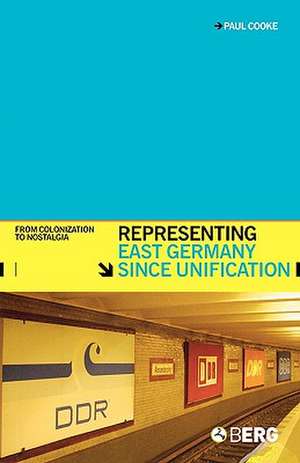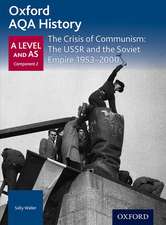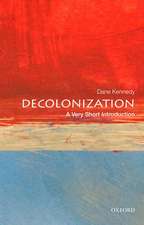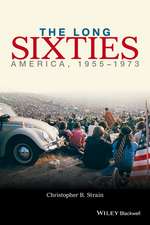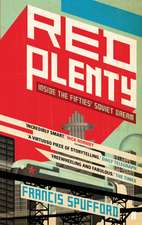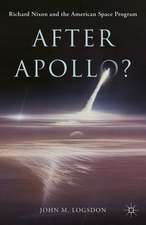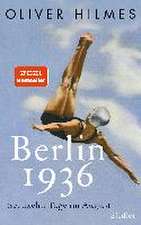Representing East Germany since Unification: From Colonization to Nostalgia
Autor Paul Cookeen Limba Engleză Paperback – 31 iul 2005
| Toate formatele și edițiile | Preț | Express |
|---|---|---|
| Paperback (1) | 191.22 lei 6-8 săpt. | |
| Bloomsbury Publishing – 31 iul 2005 | 191.22 lei 6-8 săpt. | |
| Hardback (1) | 713.79 lei 6-8 săpt. | |
| Bloomsbury Publishing – 31 iul 2005 | 713.79 lei 6-8 săpt. |
Preț: 191.22 lei
Nou
Puncte Express: 287
Preț estimativ în valută:
36.59€ • 38.31$ • 30.28£
36.59€ • 38.31$ • 30.28£
Carte tipărită la comandă
Livrare economică 05-19 aprilie
Preluare comenzi: 021 569.72.76
Specificații
ISBN-13: 9781845201890
ISBN-10: 1845201892
Pagini: 256
Ilustrații: bibliography, index
Dimensiuni: 138 x 216 x 14 mm
Greutate: 0.33 kg
Editura: Bloomsbury Publishing
Colecția Bloomsbury Academic
Locul publicării:London, United Kingdom
ISBN-10: 1845201892
Pagini: 256
Ilustrații: bibliography, index
Dimensiuni: 138 x 216 x 14 mm
Greutate: 0.33 kg
Editura: Bloomsbury Publishing
Colecția Bloomsbury Academic
Locul publicării:London, United Kingdom
Caracteristici
Also available in paperback, 9781845201890 £16.99 (August, 2005)
Notă biografică
Paul Cooke is Senior Lecturer in German Studies at the University Leeds.
Cuprins
Postcolonial Studies, Colonization and East Germany * The Federal Republic's 'Orient'? Dealing Officially with the GDR * 'Writing Back': Dealing with the Stasi in Literature * Productive Hybridity: Nostalgia and the GDR on Film * Re-exoticising the Normal: the Ostalgie Industry and German Television * A Postcolonial Culture? Surfing for the GDR in Cyberspace
Recenzii
Paul Cooke's stimulating study of post-unification German culture illuminates the interrelationship between literature, film, television and the internet as communicative forms. It shows how the changing representation of East Germany, viewed both as an historical reality and a 'discursive space', has become a key indicator of Germany's progress towards the elusive goal of inner unity.
This is a must-read text for scholars of all disciplines interested post-Wall German identities.
A highly original and outstanding book. The idea of analysing Germany's post-unification developments under the rubric of post-colonialism is daring indeed, and likely to promote much discussion and debate.
Cooke's book offers a rich account of cultural life since unification, which is made the richer for its inclusion of innovative studies of television and the Internet and insightful readings of film and literature. For this reason it will undoubtedly be extremely useful not only for scholars and students of German Studies but also for students of Cultural Studies, Critical Theory and European Studies.
This is a must-read text for scholars of all disciplines interested post-Wall German identities.
A highly original and outstanding book. The idea of analysing Germany's post-unification developments under the rubric of post-colonialism is daring indeed, and likely to promote much discussion and debate.
Cooke's book offers a rich account of cultural life since unification, which is made the richer for its inclusion of innovative studies of television and the Internet and insightful readings of film and literature. For this reason it will undoubtedly be extremely useful not only for scholars and students of German Studies but also for students of Cultural Studies, Critical Theory and European Studies.
